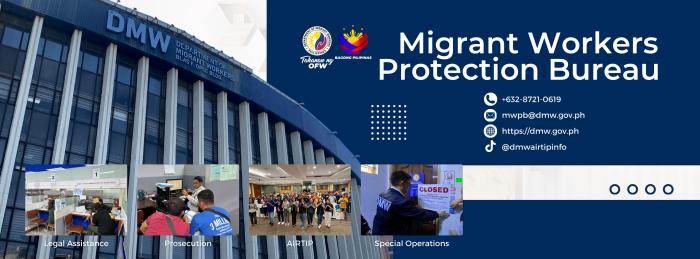Last March 25, 2025, many news outlets featured the repatriation of 30 overseas Filipino workers (OFWs) from Myanmar. They were victims of illegal recruitment and human trafficking, forced to work in “scam hubs” that victimize people online. What’s scary is that the OFWs “hired” to work in these hubs are also victims themselves!
Upon arrival in the Philippines, the OFWs were given immediate assistance, such as financial aid, legal aid, and psychosocial services. However, “scam hubs” are not the only schemes that have victimized and continue to prey on OFWs and jobseekers.
OFWs and Jobseekers: Stay Away from These Scams
Below is a list of scams that have victimized OFWs and jobseekers; these scams usually involve illegal recruitment, human trafficking, identity theft, and other schemes. The list is based on the Facebook page of the the Anti-Illegal Recruitment and Trafficking in Persons Program, which is carried out by the Department of Migrant Workers – Migrant Workers Protection Bureau (DMW – MWPB).
1. Scam Hubs
Recently, Philippine news outlets reported the rescue and repatriation of OFWs who had been forced to work in “scam hubs.” According to one of the victims, they were offered a job as customer service representatives in Thailand. Instead, however, they were brought to Myanmar, forced to work in a scam hub for up to 16 hours a day — without salary and days off! What’s worse, they experienced abuse from their “employers” whenever they were unable to meet their assigned “quotas.”
In such cases, victims were usually recruited through Facebook, Telegram, and WhatsApp. Most are sent to Singapore, Thailand, or Vietnam as “tourists” before being brought to Cambodia, Laos, or Myanmar to become online scammers.
2. Backdoor Exit Scheme
Here’s how the “backdoor exit” scheme works: Filipinos exit the country through backdoor pathways such as Zamboanga, before going to Sabah, Malaysia or other nearby countries where travel visas are not required. The typical mode of transport used are speedboats, motorboats, or ships. Eventually, the Filipinos are brought to another place where they become undocumented workers, or worse — victims of human trafficking and exploitation.
How can jobseekers avoid falling prey to this scheme? The DMW warns that if the job offer does not involve a working visa or permit, or if the workers will be transported by boat through a backdoor exit or other suspicious travel arrangements — then it is most likely an illegal recruitment or human trafficking scam.
3. Third/Cross Country Recruitment Scheme
Similar to the backdoor exit scheme, the third-country or cross-country scheme involves Filipinos going abroad as “tourists” before being deployed to work in another country. They are usually promised lucrative job offers in a “third country.
The problem with this scheme is that it bypasses proper legal channels, thus exposing OFWs to the risks of human trafficking and exploitation. Once again, the DMW cautions jobseekers against any job efforts that involve third-country or cross-country travel arrangements. They also remind that all all job offers must be processed by accredited agencies and go through legal channels.
4. Fake Recruitment Agencies
Speaking of agencies, jobseekers are warned against fake companies that are posing as licenses recruitment agencies for OFWs. There are many such groups and individuals, both online and offline. They usually operate by sending an email or text message, offering a lucrative job abroad. When an unsuspecting victim responds, he/she is asked to pay a huge amount as “placement fee.” But as soon as payment is made… the agency disappears!
The DMW warns that if a job offer involves asking for money, it is most likely a scam. Jobseekers are advised to meet and transact only with DMW-licensed recruitment agencies, within an actual office and not outside or elsewhere. Moreover, all expenses paid (e.g. medical, placement, etc.) must include an official receipt.
5. Fake DMW Personnel
The DMW is the main agency responsible for protecting and promoting the rights of OFWs, and it oversees all agencies and processes involved in overseas deployment. Unfortunately, there are individuals and groups posing as DMW personnel, claiming to operate and make transactions in behalf of the agency.
Jobseekers are cautioned against transacting with suspicious persons claiming to be DMW personnel. Rather, they are advised to be critical of emails or messages that do not come from official accounts or communication channels of the DMW.
6. Online Fixers
It is no secret that when it comes to government services, there are many “fixers” offering their services for a smooth and legitimate transaction. These include online fixers who ask for payment in exchange for processing OFWs’ Overseas Employment Certificate (OEC). Beware of these fixers, as they are scammers!
Issuance of the OEC is a FREE service of the DMW, similar to creating an e-Registration account or getting an OFW Information Sheet. Jobseekers are advised to avoid fixers, and to make transactions with official DMW personnel and channels only!
7. “Airport Escort” Services
Recently, the Bureau of Immigration (BI) intercepted a 27-year-old Filipina who tried to bypass departure counters at NAIA Terminal 3, without having a passport or boarding pass. Upon investigation, it was found that she is a victim of a scam; she paid PHP 120,000 for “airport escort services” that promised her a job abroad .
Once again, anyone who is offering a “hassle free” immigration process in exchange for money is undoubtedly a scammer. Jobseekers are urged to follow the legitimate job application process through the DMW to avoid becoming scam victims.
8. “Tanim Bala” Scam
This is another scam that targets not just OFWs, but foreign tourists and Filipino travelers, too. There have been cases of “airport security” personnel approaching passengers, telling them that a bullet has been detected in their luggage. To appease the anxious passenger, they ask for money in exchange for letting the incident “slide.”
Unfortunately, these incidents often involve airport personnel themselves. Although the airport authority has supposedly “cleaned” their ranks — terminating erring personnel and tightening security measures (e.g. offering to wrap luggage in plastic and avoid “tanim bala”), such cases still happen from time to time. OFWs and other travelers are reminded to be careful who they interact with at the airport and to watch their bags at all times.
9. Lending and Investment Scams
These type of scams usually target OFWs and other working Filipinos. Through social media, the criminals offer loans with low interest, or a lucrative investment that promises high returns. The unsuspecting victim proceeds to provide bank account details, passport details, and other personal information. He/She is also asked to pay a deposit and other “processing” fees. However, the promised loan or investment earnings are not actually given, and the entire program turns out to be a scam!
10. Love Scam
The love scam targets not just OFWs, but other workers and even retirees. The scammer starts by building a “romantic” relationship with the victim online, before asking for money to cover emergencies and various expenses. Unfortunately, this type of scam not only robs victims of their hard-earned money, but also plays with their emotions and well-being.

Tips to Avoid Recruitment Scams
To avoid falling victim to scams that target OFWs and jobseekers, the DMW urges everyone to “Maging Matalino, Huwag Magpaloko!” (Be Wise, Don’t be Fooled!). Here are some tips from the DMW’s Migrant Workers Protection Bureau (MWPB):
- Beware of job offers that sound “too good to be true,” including those that offer extremely high salaries and benefits. Ask the DMW if you have any doubts about a job offer.
- Avoid job offers received via email and advertisements on social media, especially those that ask for money.
- Apply only through the offices of licensed recruitment agencies that have approved job orders from the DMW. Do not apply at consultancy firms, training centers, language schools, or travel agencies, as these are not authorized to recruit overseas workers.
- Make sure that the placement fee does not exceed one month’s salary. Ask for a receipt every time you make a payment.
- Make sure that you have a working visa or work permit before working abroad — not a student, tourist, or visit visa.
Video: Webinar on Scam-Proofing
Last March 30, 2024, the MWPB held a webinar titled “Scam-Proofing OFWs: Protecting Your Job, Money, and Rights in the Middle East and North Africa.” Although this topic focuses on OFWs in the Middle East and North Africa Region, it still provides many practical tips for OFWs working anywhere in the world.
Watch the webinar below, as featured by the DMW Anti-Illegal Recruitment and Trafficking in Persons Program Facebook page:
Contact Information: DMW Migrant Workers Protection Bureau
To learn more about scams that target OFWs, or to report a scam, you can get in touch with the Migrant Workers Protection Bureau (MWPB) through the following contact details:
Address: 4F Blas F Ople Building, Ortigas Ave corner EDSA, Mandaluyong, Philippines
Telephone: +632 8721 0619
Email: mwpb@dwm.gov.ph / airtipinfo@dmw.gov.ph
Website: https://dmw.gov.ph/
Facebook: https://www.facebook.com/dmwairtip/
Google Map Location:
Final Thoughts
Many Filipinos decide to work abroad in order to support their families and provide them with a comfortable life. Unfortunately, there are many groups and individuals that seek to rob OFWs of their hard-earned money. Hence, it’s important to be aware of these scams, how they operate, and how to avoid them!
Another type of scam that targets all types of workers — OFWs and Philippine-based workers alike — is the “crypto-scam.” Read this article to learn more about crypto-scams and how to avoid them.
